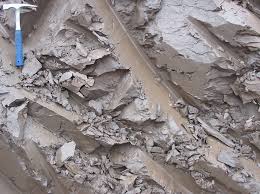clay
英 [kleɪ]
美 [kleɪ]
- n. [土壤] 粘土;泥土;肉体;似黏土的东西
- vt. 用黏土处理
- n. (Clay)人名;(英、法、西、意、葡)克莱
使用频率:

记忆方法
记忆单词“clay”可以采用“联想记忆法”,将其与“klay”谐音,想象你在用“klay”这种黏土来塑造形象,就像艺术家用黏土塑造雕塑一样,因此“clay”就是“黏土”的意思。
以上内容由AI生成, 仅供参考和借鉴
中文词源
clay 黏土
来自PIE*glei,黏,粘,词源同cling,glue.
英语词源
- clay
-
clay: [OE] Clay is named from its consistency – its stickiness, its squidginess, its capacity for being smeared. Its ultimate source is the Indo- European base *gloi-, *glei-, *gli-, from which English also gets glue and gluten. From it was descended the Germanic base *klai-, on which was formed West Germanic *klaijō-. This passed into Old English as clæg – hence modern English clay. (Clammy comes from the same Germanic source, and clag, from which we get claggy ‘muddy’, is essentially the same word as clay, although it reached English via a Scandinavian route.)
=> clammy, clean - clay (n.)
- Old English clæg "stiff, sticky earth; clay," from Proto-Germanic *klaijaz (cognates: Old High German kliwa "bran," German Kleie, Old Frisian klai "clay," Old Saxon klei, Middle Dutch clei, Danish klæg "clay;" also Old English clæman, Old Norse kleima, Old High German kleiman "to cover with clay"), from PIE root *glei- "clay" (cognates: Greek gloios "sticky matter;" Latin gluten "glue;" Old Church Slavonic glina "clay," glenu "slime, mucus;" Old Irish glenim "I cleave, adhere").
in Scripture, the stuff from which the body of the first man was formed; hence "human body" (especially when dead). Clay pigeon is from 1888. Feet of clay "fundamental weakness" is from Dan. ii:33.
权威例句
- 1. As the wheel turned, the potter shaped the clay.
- 轮子一边转动,制陶工人一边拉坯。
- 2. The clay court was slippery and he was unable to move freely.
- 红土网球场很滑,他不能自如地移动。
- 3. When the clay feels like putty, it is ready to use.
- 黏土摸起来像油灰时,就可以用了。
- 4. He studied sculpture because he enjoyed working with clay.
- 他学习雕塑是因为他喜欢玩黏土。
- 5. Grace broke off a large piece of the clay.
- 格雷斯掰下来一大块土。